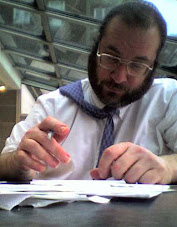
I thought I'd heard it all, but Wednesday night I heard what sounded to me like a very original definition of that very-hard-to-define-thing-we-call spirituality. Usually, people put things like "connectedness" or "relationship to the transcendent" at the center of their spirituality definitions. But, under this new definition the thing that makes spirituality, spirituality is the mystery of the
unknown. Here's how its author, Lehman College social work professor
Evan Senreich puts it:
Spirituality refers to a human being's subjective relationship (cognitive, emotional, and intuitive) to what is unknowable about existence, and how a person integrates that relationship into a perspective about the universe, the world, others, self, moral values, and one's sense of meaning.
Contrast this with a very common definition one finds in the counseling literature:
Spirituality is defined as a relationship with God, or whatever is held to be the Ultimate (for example, a set of sacred texts for Buddhists) that fosters a sense of meaning, purpose, and mission in life. (David Hodge, 2001; emphasis, mine)
Now, I happen to like Hodge's definition (this is not the only one Hodge has offered over the years, but they're all similar). For one, I like Hodge's idea that a person's spirituality can best be thought of as a
relationship with something. Second I like the use of the word Ultimate. In my view, this broadens the definition to include people who do not believe in God (or gods). I believe that _every person_ has some kind of view of the Ultimate (or of Ultimate Values), and that, therefore, that every person (atheist or not) has a spirituality (that, from the view of a counselor, could be assessed). Each person's spirituality (or spiritual system) gives him or her a view of what is good in the world -- what is right, what is wrong, what is the thing most important to strive for.
But, I've learned that some think a definition like Hodge's does _not_ cover every person. I guess this comes down to a difference in how we each understand the word Ultimate. I don't think it implies any belief in anything supernatural, but others think it does. If the others are right, definitions like Hodges do _not_ cover everybody.
Senreich -- who was speaking at a meeting of an NYU social work student group called the Integrating Spirituality and Practice group -- is one of those how think a definition like Hodge's is not broad enough to cover everybody. He also doesn't like definitions that seem to privilege certain kinds of spiritualities -- especially Western and Christian ones -- over others. But he is also critical of spirituality definitions that are too broad, ones that don't bring something new to the social worker's usual bio-social models for client assessment.
I like the way his definition seems to well meet this last criterion. The bio-social framework does not emphasize the core aspect of spirituality that Senreich's definition does -- the element of spirituality that is about a person asking "Big Questions" about things that can never truly be known for sure from any scientific source. Things like: Why is there evil and suffering in the world? Why do I have to die and do I go anywhere after that? What is the 'good'? And, of course, why do bad things happen to good people?
But I'm not sure that this element of the unknowable -- of mystery or even the ineffable -- is all of what spirituality is about. I, at least, don't think my (Jewish) spirituality is all about questions like this. It's also about actions, about feeling commanded and such. It's also about a deep connection to a community of people who have existed for thousands of years. Is this all about the 'unknowable'?
I'm not sure what the answer is -- and whether Senreich's definition really works for me -- but I was so glad to run across his ideas. It seems like a very fresh approach.




